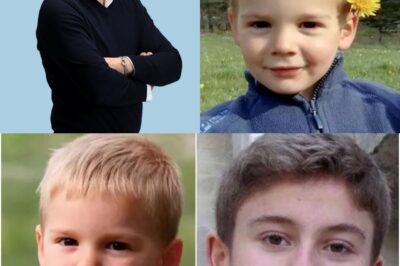Mes parents ont tout légué à mon frère, alors j’ai arrêté de payer leurs factures. Un mois plus tard, maman m’a envoyé un texto : « La date limite de remboursement du prêt immobilier est arrivée ! » Je viens d’écrire ceci… Ma réponse a fait pâlir tout le monde… !

La découverte qui a tout changé
Je m’appelle Jacob , et si j’avais des doutes sur ma place dans ma famille, ils se sont envolés le jour où j’ai découvert le testament. Ce n’était pas lors d’une discussion familiale passionnée ou d’une confrontation dramatique ; je l’ai découvert complètement par hasard, par pur hasard.
C’est arrivé un samedi après-midi ordinaire, dans cette même petite maison de ville près de Chicago où j’avais passé d’innombrables week-ends à réparer des canalisations cassées, tondre la pelouse et régler des factures que mes parents ne pouvaient plus payer. J’avais contribué au financement de cette maison ces cinq dernières années : l’hypothèque, les courses, les réparations, tout ce qui était essentiel à son fonctionnement.
Pendant ce temps, mon petit frère, Eric , vivait là aussi. Mais quand je dis « vivre », je veux dire se prélasser . Pas de travail. Aucun effort. Juste des heures interminables à dormir, à naviguer sur son téléphone et à jouer à des jeux vidéo pendant que mes parents lui préparaient ses repas et que moi, la responsable, je payais leurs factures.
Et pourtant, d’une certaine manière, mes parents parlaient toujours de lui avec fierté – comme si être « créatif » et « encore en train de réfléchir » à 29 ans était admirable. C’était frustrant, mais je l’ai digéré. Je me disais qu’ils étaient juste gentils, qu’un jour ils apprécieraient tout ce que je faisais pour eux.
Cette illusion s’est brisée le jour où j’ai trouvé leur testament.
Papa m’avait demandé de l’aider à numériser quelques documents – déclarations d’impôts, documents d’assurance et autres documents officiels qu’ils ne comprenaient pas. En triant les dossiers sur la table, une étiquette a attiré mon attention : « Planification successorale – Testament. »
Bon, je ne suis pas un fouineur. Normalement, je ne fouillerais jamais dans les papiers privés de quelqu’un. Mais quelque chose m’a fait réfléchir. Après tout, c’était moi qui soutenais leurs finances. Il n’était peut-être pas déraisonnable de voir comment ils comptaient gérer leurs biens, y compris la maison que je contribuais à financer.
Alors, j’ai ouvert le dossier.
Au début, j’ai parcouru le texte avec désinvolture, ne m’attendant à rien d’inhabituel. Puis mon regard s’est figé sur une ligne qui m’a fait bondir.
“All property, savings, and assets are to be bequeathed to our beloved son, Eric.”
I blinked, thinking maybe I’d misread. I scrolled further, searching for my name. It was there — once.
“We leave our love and gratitude to both our sons, Jacob and Eric.”
That was it. Love and gratitude for me. The entire inheritance for him.
I felt my stomach twist, a cold wave of disbelief washing over me. I read it again and again, hoping there was a mistake. There wasn’t. Everything — the house, savings, insurance, all of it — was going to Eric, the one who had contributed absolutely nothing.
Meanwhile, I, the son who had been paying their mortgage, buying their food, keeping the lights on, and showing up whenever something broke — got nothing but “love.”
I laughed bitterly, but it wasn’t out of humor. It was one of those dry, hollow laughs that come from deep hurt.
How long had they planned this? Had they always intended for me to be their unpaid caretaker while Eric enjoyed the rewards? Did they ever appreciate what I’d done for them?
I was still sitting there, shaking, when I heard Dad’s voice from the living room.
“Jacob, what’s taking so long?”
He walked in, wiping his hands on a towel. The moment his eyes fell on the folder in my hands, I saw the flicker of recognition — and guilt.
I didn’t hide it. I just looked at him and said, quietly but firmly, “So this is how it is, huh? Everything to Eric. After all I’ve done.”
Dad’s face paled. For a second, he looked like he might actually explain. But then he sighed, shaking his head slightly, as if I was the unreasonable one.
“Jacob, it’s not what you think,” he said.
“Really?” I snapped. “Because it looks pretty damn clear to me. I pay your mortgage, your groceries, every repair in this house. Eric doesn’t lift a finger — and yet he’s the one who matters?”
He rubbed his forehead and muttered, “It’s complicated.”
That was it. It’s complicated. No apology. No reasoning. Just a dismissive excuse.
I took a deep breath, trying to calm the anger rising in my chest. “Where’s Mom?” I asked. “I want to hear it from both of you.”
Mom came into the room, her face soft and unsure. She looked from me to the folder, instantly realizing what I’d seen. Her lips trembled for a second before she spoke.
“Jacob, honey,” she said gently, “you don’t need an inheritance. You have a good job, you’re independent. But Eric… he’s struggling. We just want to make sure he’s taken care of.”
That was the breaking point.
They weren’t even pretending it was fair. They weren’t hiding it or apologizing. They believed it was right.
I stared at her, speechless. All those years — all the money, all the help, all the late nights fixing their problems — and in the end, I was being punished for being responsible.
Finally, I said in a voice I barely recognized, “Got it. Good to know where I stand.”
Then I put the folder down, walked out the front door, and didn’t look back.
That was the last time I saw my parents’ house. I didn’t call, didn’t check in, didn’t pay another bill. For the first time in years, they had to handle their own life — their own repairs, groceries, and mortgage payments.
For a while, the silence felt strange. But it also felt good.
Two weeks passed before I heard from them again. A simple text from Dad:
“Property tax deadline coming up.”
That was it. No apology, no small talk, no acknowledgment of what had happened. Just a reminder, as if I were still their personal banker.
I stared at my phone, almost laughing at how shameless it was. Then I typed back:
“I think Eric can handle it, since the house is his now.”
Five minutes later, my phone rang. Mom. I ignored it.
A few minutes after that, a message came through:
“Jacob, please don’t be like this. We need to talk.”
Now they wanted to talk. Now that the bills were piling up.
I waited an hour before replying:
“Nothing to talk about. You made your choice. Now live with it.”
And that was the moment I truly walked away.
That night, lying in bed, I felt something I hadn’t felt in years — peace.
It wasn’t the kind of peace that comes from happiness. It was the kind that comes from clarity. For years, I had given everything, thinking love meant sacrifice. But that day, I realized love without respect is just exploitation dressed up as family duty.
For once, I wasn’t the one cleaning up their mess. For once, I didn’t feel guilty. I felt free.
The Golden Boy’s Reality Check
The silence lasted exactly two weeks before it all started to unravel.
At first, I think my parents genuinely believed I was bluffing — that I just needed time to “cool off,” and then, like always, I’d come back around. I’d pay the bills, fix the leak in the roof, bring groceries, and everything would go back to normal. That was the pattern.
But this time, there was no coming back.
And as the bills began to pile up, I could almost feel the panic creeping through their messages.
It started small.
A text from Mom one morning:
“Hi, sweetheart. Just wondering if you could help your dad with the utility bill this month? He’s having trouble figuring out the online payment.”
I didn’t respond.
A few hours later, another message:
“Jacob, please, don’t ignore us. The account’s overdue, and I don’t want it shut off. Can you just take care of it this once?”
This once.
I almost laughed. “This once” had been the story of my life. Every time I told myself it was the last time, it became another “just this once.”
So I ignored that message too.
Two days later, Dad texted. His tone was short, clipped — like a man too proud to beg but too desperate to hide it.
“Mortgage payment due. Need it handled ASAP.”
No greeting. No thank you. Just an order.
I stared at the screen for a while, my anger bubbling. Then I typed back:
“Not my problem anymore. Eric’s house, remember?”
It took less than five minutes for my phone to buzz again — Mom this time.
“Jacob, please. We’re not used to doing this without you. We’re trying, but it’s hard. Eric’s been busy with some things, and your father’s not feeling well.”
Busy with some things? Yeah, right. I could picture it perfectly — Eric sitting on the couch, controller in hand, muttering something about “job searching” while my parents tiptoed around him, too afraid to ask for help.
I didn’t reply.
That night, my phone buzzed again. This time it wasn’t Mom or Dad. It was Eric.
His name flashing on the screen made my blood boil. I hesitated for a moment, then opened the message.
“Dude, what’s your problem? Mom and Dad said you’re refusing to help with the bills.”
My problem?
I stared at the text for a moment, trying to calm down before responding.
“Not my responsibility anymore. Everything belongs to you now, remember? Congratulations, homeowner.”
He replied almost instantly:
“Jesus, man. Are you really this petty? It’s just money.”
Just money.
The same guy who never had a job, never paid rent, and still lived off our parents had the audacity to say it’s just money.
“Then it shouldn’t be hard for you to handle it,” I typed back. “Start adulting.”
No reply after that.
A few days passed, and the messages slowed down. I thought maybe they’d finally accepted reality — that I wasn’t coming to the rescue this time. But then, one morning, I woke up to a notification that made my jaw drop.
Money Transfer Request: $5,000.
From Mom.
No explanation, no message — just a cold, automated request like I was their bank app.
I declined it immediately.
Two minutes later, my phone rang. Mom again. I didn’t answer. Then a message came through:
“Jacob, I know you saw the request. Why did you decline it?”
I replied simply:
“Because it’s not my responsibility. Ask Eric.”
Seconds later, another message:
“Jacob, please stop this. You’re being cruel. We’re family.”
Family. That word stung in a way it never had before.
For years, they had used it to guilt me into obedience. Family helps each other. Family sacrifices. But what kind of family leaves one son with nothing while rewarding the other for doing nothing?
So I wrote back:
“Family doesn’t use one child and worship another. You made your choice. Live with it.”
That night, I turned my phone off. I needed silence — the kind that didn’t come with guilt trips or pleas for money. For the first time in years, I went to bed without worrying about my parents’ bills.
But the peace didn’t last long.
The next evening, while I was having dinner, I got a message from my cousin Lisa.
“Hey, did you hear about the power being cut off at your parents’ place?”
I froze mid-bite.
Apparently, the utility company had shut off the electricity for nonpayment. I didn’t know whether to feel bad or relieved. On one hand, they were suffering because of their choices. On the other, part of me still loved them.
I typed back:
“Yeah, I heard. They’ll figure it out.”
Then I set the phone down, trying to convince myself I meant it.
The next day, Eric called. This time, I answered. I was tired of texts and half-truths.
“Jacob,” he started, his voice tense. “What the hell are you doing? Mom’s freaking out. Dad’s been sick, and now the power’s off. You can’t just abandon them!”
“I didn’t abandon them,” I said coldly. “They abandoned me when they decided I didn’t matter.”
He scoffed. “You’re really going to hold a grudge over a stupid will? They were just trying to make things fair.”
“Fair?” I snapped. “You get the house, the savings, everything — and I get to keep paying their bills? How the hell is that fair?”
There was silence on the line. Then he muttered, “You don’t understand. They needed to make sure I’m stable before—”
“Before what?” I cut in. “Before you start acting like an adult? News flash, Eric — you’re 29. Time to grow up.”
He started to say something, but I hung up. I was done.
That night, I sat on my couch staring at my phone, half expecting another guilt message. Instead, there was nothing. Just silence.
For a brief moment, I wondered if I’d gone too far. If maybe I should’ve at least checked in to make sure Dad’s health was okay. But then I remembered the words on that will — everything to Eric — and my pity turned to steel.
They’d made their decision. Now they could live with it.
Still, I had no idea that this was just the beginning.
Because within the next few weeks, as bills kept coming and the house started falling apart, Eric’s perfect little world — and theirs — would begin to crumble.
And when they did finally come crawling back, it wasn’t with apologies.
It was with demands.
When the Golden Boy Falls
Three weeks. That’s all it took for Eric’s shiny new world to start falling apart.
At first, I only heard about it through whispers — my cousin Lisa again, who lived down the street from my parents. She said things at the house were… tense. The bills were late. The car insurance had lapsed. The lawn, once perfectly trimmed, now looked wild and overgrown.
“Your brother’s been arguing with your dad nonstop,” she said one afternoon over the phone. “I heard shouting from the porch. Something about money.”
I just nodded, staring out the window of my apartment.
It wasn’t satisfaction I felt — not exactly. It was something darker, quieter. Like watching a storm from inside a warm house. You’re dry, but the thunder still rattles you.
Then one night, my phone buzzed. It was Eric.
I almost ignored it, but something in me — maybe curiosity, maybe that leftover guilt — made me answer.
“Jacob, hey,” he said, his tone forced and casual. “How’s it going?”
I could hear the strain in his voice. I didn’t bother pretending. “Cut to the chase, Eric. What do you want?”
He sighed. “Look, things have been… rough. Dad’s been in and out of the hospital, and Mom’s been stressed. The bills—”
“There it is,” I interrupted. “The bills.”
“Don’t start,” he snapped, his patience cracking. “I’m doing my best here. But the mortgage, the utilities, the repairs—it’s a lot. I didn’t realize how much you were covering.”
“Oh, you didn’t?” I said sharply. “That’s funny, because I remember trying to tell you that for years. But you and Mom were too busy pretending you were the second coming of Einstein to listen.”
He was silent for a moment. Then, softly, he said, “I’m asking for help, Jacob. Not for me—for them.”
That stung. He knew exactly which buttons to press.
“I already helped,” I said, my voice low. “For ten years. Now it’s your turn.”
Then I hung up.
A week passed before I heard from anyone again. And when I did, it wasn’t a call. It was a photo.
Mom had sent me a picture of Dad — frail, sitting in a hospital bed. His face looked pale, his eyes distant.
Underneath it, she’d written:
“He’s been asking for you.”
That one line broke me in ways the will never could.
For all the anger, all the betrayal, I still loved him. I still remembered the man who taught me to ride a bike, who stayed up with me the night before my first big job interview. He wasn’t just the man who’d signed a piece of paper choosing Eric over me. He was my father.
So that night, I drove to the hospital.
When I walked into the room, Mom’s eyes widened. She looked like she hadn’t slept in days.
“Jacob,” she whispered, standing up. “You came.”
Dad turned his head slowly, his voice faint. “Son.”
I swallowed hard. “Hey, Dad.”
For a few seconds, no one said anything. The silence was heavy — thick with everything we hadn’t said in months.
Finally, Dad motioned for me to sit. I pulled up a chair beside him.
“I messed up,” he said quietly.
I blinked. “What do you mean?”
“The will,” he said, his voice trembling. “Your mother and I thought we were doing what was right. Eric… he needed more help. We didn’t realize what it would do to you.”
Mom looked away, tears in her eyes.
I felt something shift inside me — anger colliding with grief. “You didn’t realize? Dad, you watched me work two jobs. You saw me pay for everything while he sat home playing video games. How could you not realize?”
He closed his eyes. “Because you never complained. You were always… strong. We thought you could handle it.”
That line hit like a punch.
Strong.
It had always been their excuse. I didn’t need help, because I was strong. I didn’t need love, because I was capable. I didn’t need fairness, because I was fine.
I stood up, my chest tight. “Being strong doesn’t mean I don’t feel pain, Dad. It means I’ve had to hide it.”
He looked at me, tears gathering in his eyes. “I’m sorry, Jacob. Truly.”
For the first time in years, I believed him.
Before I left, Mom caught me at the door.
“Jacob,” she whispered, “we might lose the house. The bank’s sending notices. I don’t know what to do.”
I stared at her, unsure what to say.
Part of me wanted to help — to save them, like always. But another part of me screamed no. Not again.
Then she added softly, “Eric’s been trying, but he can’t keep up.”
Trying. Right. I’d believe that when I saw it.
Still, as I drove home that night, I couldn’t shake the image of my father — frail, apologetic, human.
Maybe I wasn’t ready to forgive them yet.
But I wasn’t ready to hate them anymore, either.
Three days later, I got a call from Lisa again. Her voice was urgent.
“Jacob, you need to come by the house,” she said. “Something’s happened.”
My stomach dropped. “What do you mean?”
She hesitated. “It’s Eric.”
“What about him?”
“He’s gone,” she said. “He packed up last night and left. Your mom woke up this morning to find a note. He took what little money was left and disappeared.”
For a long time, I didn’t say anything.
I just stood there in the middle of my apartment, the phone pressed against my ear, feeling everything collapse — anger, resentment, exhaustion — into a single, crushing truth.
The golden boy had finally fallen.
And the ones left behind were the same people who had broken me in the first place.
Only now… they had no one else to turn to.
Family takes care of each other. We did so much for you when you were growing up. And now you’re just abandoning us.»
I took a deep breath to keep from hurling my phone at the wall. Abandoning them? I’d spent years making sure they lived comfortably while they babied Eric, encouraging his laziness.
And now, when they finally had to face the consequences of their own decisions, I was the bad guy? But this time, I wasn’t falling for it. I typed back: «You made it clear I’m not part of the family when you left me out of the will.
Now let Eric take care of you.» I could practically hear Mom’s theatrical gasp in my head, like she always did when she wanted to play the victim, even when she was wrong. A few minutes later, a message from Dad came through, and it made me boil over…
Dad: «We’re not asking for much. Just help with the mortgage for a few more months while we sort things out. Don’t be selfish.»
Selfish? The word literally made my blood boil. I’d pulled them out of financial holes for years, sacrificing my own money, time, and energy to make their lives easier. I’d done everything a good son should.
And how did they repay me? By leaving me with nothing. And now, when I finally stood up for myself, I was the selfish one? I gritted my teeth, took a deep breath, and typed: «No, I’m done.»
After that, I just turned off my phone. They’d made their choice. Now they had to live with it.
Le silence a duré exactement une journée. Je savais que mes parents n’abandonneraient pas si facilement, mais je n’étais pas préparé à cela. Le lendemain matin, je me suis réveillé avec une notification : « Demande de virement. »
J’ai froncé les sourcils, déverrouillé mon téléphone et regardé. Ça venait de maman. Elle m’avait littéralement envoyé une demande d’argent, comme si j’étais un distributeur automatique.
Le montant : 5 000 $. Je fixais l’écran, mi-sous le choc, mi-rieuse devant cette audace. Aucun message.
Aucune explication. Juste une demande froide et éhontée de la somme exacte nécessaire pour couvrir le remboursement de leur prêt immobilier. Ils n’ont même pas demandé.
Ils ont supposé que j’allais payer. J’ai décliné la demande sans hésiter. Moins de cinq minutes plus tard, mon téléphone a sonné.
« Maman ? » Je n’ai pas décroché. Un message est arrivé : « Maman : Jacob, je sais que tu as vu la demande.
Pourquoi as-tu refusé ? Je n’ai pas réagi rapidement. Finalement, j’ai écrit : « Parce que ce n’est pas de ma responsabilité. »
Essaie Éric. » Nouvel appel. Refusé…
News
Più Buoni dei Brownies: I “Chocolate Crinkles” che Si Sciolgono in Bocca (La Ricetta Perfetta per le Feste)
Più Buoni dei Brownies: I “Chocolate Crinkles” che Si Sciolgono in Bocca (La Ricetta Perfetta per le Feste) LA RICETTA…
Qui sont les soeurs Kessler, les jumelles qui se sont donné la mort ensemble ?
Qui sont les soeurs Kessler, les jumelles qui se sont donné la mort ensemble ? Elles ont traversé l’Europe en…
De nouveaux éléments dans l’Affaire Émile ?
De nouveaux éléments dans l’Affaire Émile ? La disparition du jeune garçon de deux ans et demi le 8 juillet…
Pascal Praud, les secrets du journaliste le plus influent de France : ses coups de fil aux politiques, ses obsessions
Pascal Praud, les secrets du journaliste le plus influent de France : ses coups de fil aux politiques, ses obsessions…
“T’as envie de rire toi ?!” : Patrick Sébastien se fâche contre Apolline de Malherbe, elle baisse d’un ton
“T’as envie de rire toi ?!” : Patrick Sébastien se fâche contre Apolline de Malherbe, elle baisse d’un ton Lundi…
Star Academy : Léane fond en larmes après un nouveau coup de massue, elle craque
Star Academy : Léane fond en larmes après un nouveau coup de massue, elle craque À l’approche du prochain prime…
End of content
No more pages to load







